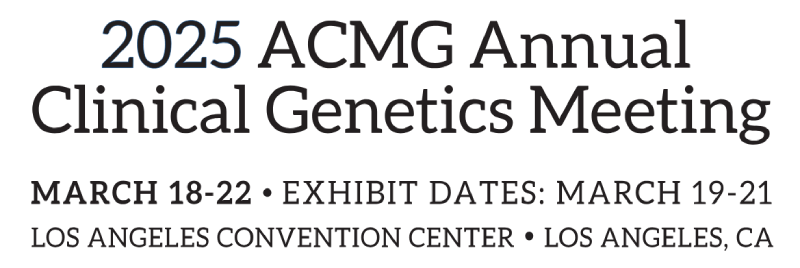The Future of Prenatal Genetics: A Journey Through Emerging Technologies and Ethical Issues
22 Mar 2025
Venue:
Los Angeles Convention Centre
Meeting Room:
515 AB
-
Accredited:
- Accredited
-
Primary Categories:
- Prenatal Genetics
-
Secondary Categories:
- Prenatal Genetics
This interactive session will explore the direction of prenatal genetic testing and fetal therapies, as well as how these developments may affect ethical considerations and disability rights. We aim to share viewpoints from individuals and families affected by genetic disease, allowing their lived experiences to inform healthcare providers.
The first talk will focus on the advancement of fetal sequencing. The presenter, Dr. Casey Brewer, is a laboratory director at Cincinnati Children’s Hospital with extensive experience in prenatal genetic testing. This presentation will discuss the availability of prenatal exome and genome sequencing, as well as the benefits and challenges of these tests. A range of prenatal diagnoses and their impact on medical care will be discussed.
The second presentation will explain how specific prenatal diagnoses can be treated in utero. The presenter, Dr. Laura Galganski, is a pediatric general and thoracic surgeon at Cincinnati Children’s Hospital and a leading expert in fetal diagnosis and therapy. Her talk will summarize existing fetal therapies for structural anomalies, including why some genetic diagnoses can disqualify individuals from these therapies. She will also introduce emerging treatments such as prenatal enzyme replacement therapy.
Following the first two talks on prenatal testing and treatments, the ethical, legal, and social implications of these developments will be explored. The presenter, Dr. Michelle McGowan, is a Professor of Biomedical Ethics at Mayo Clinic. Her talk will examine how societal views of genetic conditions have changed over time and how improved testing and treatments may impact these views. The topic of disability rights will be highlighted and discussed.
The fourth talk will focus on the lived experience of those affected by a genetic condition. The presenter, Jacquelynn Berton, is a genetic counselor at the Cincinnati Children’s Fetal Care Center. Her talk aims to include videos from families, illustrating the challenges they have encountered as well as the blessings they have received. This presentation will emphasize the patient’s uniqueness rather than their diagnostic category and how a patient-centered approach can allow for improved, personalized treatment.
This is a 1.5-hour session that includes interactive polling questions and a 30-minute Q&A period. The moderator, Dr. Huda Al-Kouatly, is a Maternal-Fetal Medicine specialist and Clinical Geneticist at Thomas Jefferson University. She has >20 years of experience in Maternal-Fetal Medicine and is the Medical Director of the Genetic Counseling Graduate School at Thomas Jefferson University.
The first talk will focus on the advancement of fetal sequencing. The presenter, Dr. Casey Brewer, is a laboratory director at Cincinnati Children’s Hospital with extensive experience in prenatal genetic testing. This presentation will discuss the availability of prenatal exome and genome sequencing, as well as the benefits and challenges of these tests. A range of prenatal diagnoses and their impact on medical care will be discussed.
The second presentation will explain how specific prenatal diagnoses can be treated in utero. The presenter, Dr. Laura Galganski, is a pediatric general and thoracic surgeon at Cincinnati Children’s Hospital and a leading expert in fetal diagnosis and therapy. Her talk will summarize existing fetal therapies for structural anomalies, including why some genetic diagnoses can disqualify individuals from these therapies. She will also introduce emerging treatments such as prenatal enzyme replacement therapy.
Following the first two talks on prenatal testing and treatments, the ethical, legal, and social implications of these developments will be explored. The presenter, Dr. Michelle McGowan, is a Professor of Biomedical Ethics at Mayo Clinic. Her talk will examine how societal views of genetic conditions have changed over time and how improved testing and treatments may impact these views. The topic of disability rights will be highlighted and discussed.
The fourth talk will focus on the lived experience of those affected by a genetic condition. The presenter, Jacquelynn Berton, is a genetic counselor at the Cincinnati Children’s Fetal Care Center. Her talk aims to include videos from families, illustrating the challenges they have encountered as well as the blessings they have received. This presentation will emphasize the patient’s uniqueness rather than their diagnostic category and how a patient-centered approach can allow for improved, personalized treatment.
This is a 1.5-hour session that includes interactive polling questions and a 30-minute Q&A period. The moderator, Dr. Huda Al-Kouatly, is a Maternal-Fetal Medicine specialist and Clinical Geneticist at Thomas Jefferson University. She has >20 years of experience in Maternal-Fetal Medicine and is the Medical Director of the Genetic Counseling Graduate School at Thomas Jefferson University.
Learning Objectives
- Describe the current application of prenatal exome and genome sequencing
- Discuss fetal therapies for congenital anomalies and genetic disorders
- Evaluate how emerging prenatal technologies may conflict with legal and social views
- Value how affected families can best make their own healthcare decisions
Agenda
-
 Welcome and Introduction8:00 AM – 8:03 AM
Welcome and Introduction8:00 AM – 8:03 AM -
 The Advancement of Fetal Sequencing8:03 AM – 8:23 AM
The Advancement of Fetal Sequencing8:03 AM – 8:23 AM -
 Fetal Therapies for Structural Anomalies and Genetic Conditions8:23 AM – 8:43 AM
Fetal Therapies for Structural Anomalies and Genetic Conditions8:23 AM – 8:43 AM -
 Ethical, Legal, and Social Implications of Developments in Prenatal Genetics8:43 AM – 9:03 AM
Ethical, Legal, and Social Implications of Developments in Prenatal Genetics8:43 AM – 9:03 AM -
Lived Experiences of Families Affected by a Genetic Condition9:03 AM – 9:23 AM
-
Panel DiscussionPanel Discussion and Q&A9:23 AM – 9:30 AM
-





)
)
)
)
)
)
)
)
)
)
)
)
)
)
)
)
)
)
)
)